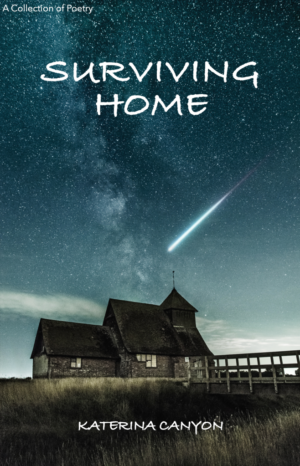Why are some people monsters? Why?
Katerina Canyon’s speaker in her brilliant, moving poetry collection Surviving Home tells us something about monsters. When Canyon chose the word “surviving“ for part of the title of this collection, she was not using a metaphor and not exaggerating. In “I Am the Complete Secret,” the speaker says, “I had parents but lived as an orphan.” She also writes, “I survived on flames” (“Holding Still”). Surviving Home is a powerful poetry collection about staying human while subjected to life-threatening abuse at the hands of monsters known to the outside world as parents.
For example, the speaker’s only brother is autistic. The father forced his son to go shoplifting with him. At age 13, his son got caught by police. The father tied his son to a post and periodically beat him with a bullwhip until the boy was unconscious and half-dead—until he stopped screaming—while his sister watched, unable to do anything except bear witness. She says, “That night, the sky was crimson” (“I Felt My Brother’s Wrists”).
The speaker’s brother was often tossed—screaming—into a closet with the door shut. The speaker would follow him into the closet and comfort him as best as she could. She sang songs and played clapping games with him to sooth him and pass the time. She became an “autism whisper[er] / In knee socks and a snoopy tee shirt” (“All Day Long”).
Canyon’s speaker calls her father a “shark” (“I Say You Can’t Go Home Again”).Both of her parents used hard drugs, heroin, PCP, crack, whatever they could get their hands on. They taught their eight-year-old daughter how to “cut” lines of cocaine. While he was under the influence, her father would accuse her of stealing his drugs and being “against him” (“Trifling with Heroin”). In “Follow the Crack Pipe,” the speaker tells us how to observe her father smoking crack:
Hold your breath as he
Exhales white smoke
Stop and wait—don’t stare
Don’t swallow the air
he releases
If you breath in
you will see a ghost
True to his despicable nature, Father sneaks into the speaker’s bedroom, forcing her to pleasure him (“I Say You Can’t Go Home Again”) while she stays “[n]umb as a tortoise / who hides in his shell” (“House at Night”). The speaker says sarcastically,
[it’s] a far cry
from rape—
The acts he makes
you perform
so close your eyes and
think of pretty things.
(“Blessings”)
And she’s supposed to be grateful that he preserves her (technical) virginity?
The icing on the cake is that the authorities don’t believe her story and call her a liar. The speaker wonders, “Would it have been different / if I were white and if I had blue eyes” (“Authority Questions”).
The speaker eventually understands that her mother was less culpable as a parent because the mother was also abused every day and had nowhere else to go (“An Afterthought of a Netflix Show”). Canyon’s speaker states:
…..In
The Promised Land, there are no negro
spirituals, no blues
no white man’s hands smiting the black man’s face
but there is always a burden for a black woman
(“Aunt Mary”)
At peace with her mother, the speaker tells us:
We are daughter and mother
Bound by the same sanguine root
she loves me
she loved me
she loves me
(“Playing with Roses”)
As an adult, Katerina Canyon has become an advocate for Blacks, especially Black women. In Surviving Home, her poetic voice is strong and carries us along as the speaker explores the meaning of both her own struggles and those of African American women as a group. She says, “I am told every woman / pays her debt with pain” (“At 13, I Found a Bra”). The evil deeds of the speaker’s father are seen within the context of society’s oppression of blacks, while at the same time, the father is held personally accountable—a complicated insight that that I give Canyon a lot of credit for. Here is what the speaker tells us:
This is my pain
My mother beaten black by my father.
My father beaten blue by police
Over my voice…..
(“My Pain Is Sculpted into Art for You to Consume”)
Make no mistake: there is no happy ending to the speaker’s story because even now, as a middle-aged black woman, she must still deal with the pain—trauma—from her childhood that never goes away. She says that her story “is told through hot cylinders of pain / That sear experiences into the skin” (“Involuntary Endurance”). Nonetheless, Katerina Canyon’s speaker has chosen to move on insofar as that’s possible and to give back, trying to make this world a better place.
Canyon’s speaker is aware that the story of her childhood might be told in a sensational way. But she pleads with us readers not to commodify her experiences, not to “consume” them as lurid entertainment, feeding on the shocking, sad details as a kind of sick porn, while we shake our heads and moan, How awful, but “do absolutely nothing” (“My Pain Is Sculpted into Art for You to Consume”).
What we as readers can do is listen and learn, without judging things that we didn’t experience and could hardly imagine without Katerina Canyon’s help. Then we should pay it forward like Canyon is doing.
I feel that a species that allows “throwaway kids” is a failed species that will ultimately become extinct. . Have I convinced you that this world needs to start respecting and protecting all of its members from monsters disguised as people?
Please read Surviving Home by Katerina Canyon. And make it so.
*

